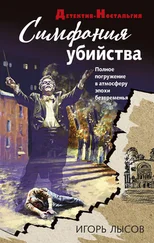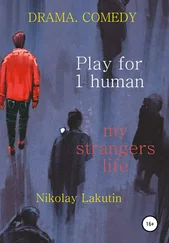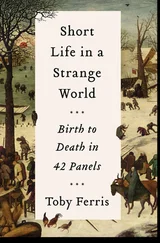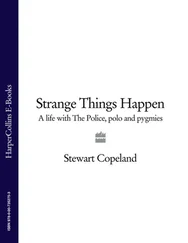Douglas Hofstadter - I Am a Strange Loop
Здесь есть возможность читать онлайн «Douglas Hofstadter - I Am a Strange Loop» весь текст электронной книги совершенно бесплатно (целиком полную версию без сокращений). В некоторых случаях можно слушать аудио, скачать через торрент в формате fb2 и присутствует краткое содержание. Жанр: Прочая документальная литература, на английском языке. Описание произведения, (предисловие) а так же отзывы посетителей доступны на портале библиотеки ЛибКат.
- Название:I Am a Strange Loop
- Автор:
- Жанр:
- Год:неизвестен
- ISBN:нет данных
- Рейтинг книги:4 / 5. Голосов: 1
-
Избранное:Добавить в избранное
- Отзывы:
-
Ваша оценка:
- 80
- 1
- 2
- 3
- 4
- 5
I Am a Strange Loop: краткое содержание, описание и аннотация
Предлагаем к чтению аннотацию, описание, краткое содержание или предисловие (зависит от того, что написал сам автор книги «I Am a Strange Loop»). Если вы не нашли необходимую информацию о книге — напишите в комментариях, мы постараемся отыскать её.
I Am a Strange Loop — читать онлайн бесплатно полную книгу (весь текст) целиком
Ниже представлен текст книги, разбитый по страницам. Система сохранения места последней прочитанной страницы, позволяет с удобством читать онлайн бесплатно книгу «I Am a Strange Loop», без необходимости каждый раз заново искать на чём Вы остановились. Поставьте закладку, и сможете в любой момент перейти на страницу, на которой закончили чтение.
Интервал:
Закладка:
SOCRATES: Then had one not better be suspicious of what we call “knowing”, or “conviction”, and not take it so much for granted?
PLATO: Precisely. We must be cautious in saying “I know”, and we must ponder what it truly means to say “I know” when our minds would have us say it.
SOCRATES: True. If I asked you, “Are you alive?”, you would doubtless reply, “Yes, I am alive.” And if I asked you, “How do you know that you are alive?”, you would say “I feel it, I know I am alive — indeed, is not knowing and feeling one is alive being alive?” Is that not right?
PLATO: Yes, I would certainly say something to that effect.
SOCRATES: Now let us suppose that a machine had been constructed which was capable of constructing English sentences and answering questions. And suppose I asked this English machine, “Are you alive?” and suppose it gave me precisely the same answers as you did. What would you say as to the validity of its answers?
PLATO: I would first of all object that no machine can know what words are, or mean. A machine merely deals with words in an abstract mechanical fashion, much as canning machines put fruit in cans.
SOCRATES: I do not accept your objections for two reasons. Surely you do not contend that the basic unit of human thought is the word? For it is well known that humans have nerve cells, the laws of whose operation are arithmetical. Secondly, you cautioned earlier that we must be wary of the verb “to know”, yet here you use it quite nonchalantly. What makes you say that no machine could ever “know” what words are, or mean?
PLATO: Socrates, do you argue that machines can know facts, as we humans do?
SOCRATES: You declared just now that you yourself cannot even explain what knowing is. How did you learn the verb “to know” as a child?
PLATO: Evidently, I assimilated it from hearing it used around me.
SOCRATES: Then it was by automatic action that you gained control of it.
PLATO: No… Well, perhaps I see what you mean. I grew accustomed to hearing it in certain contexts, and thus came to be able to use it myself in those contexts, in a more or less automatic fashion.
SOCRATES: Much as you use language now — without having to reflect on each word?
PLATO: Yes, exactly.
SOCRATES: Thus now, if you say, “I know I am alive”, that sentence is merely a reflex coming from your brain, and is not a product of conscious thought.
PLATO: No, no! You or I have used faulty logic. Not all thoughts I utter are simply products of reflex actions. Some thoughts I think about consciously before uttering.
SOCRATES: In what sense do you think consciously about them?
PLATO: I don’t know. I suppose that I try to find the correct words to describe them.
SOCRATES: What guides you to the correct words?
PLATO: Why, I search logically for synonyms, similar words, and so on, with which I am familiar.
SOCRATES: In other words, habit guides your thought.
PLATO: Yes, my thought is guided by the habit of connecting words with one another systematically.
SOCRATES: Then once again, these conscious thoughts are produced by reflex action.
PLATO: I do not see how I can know I am conscious, how I can feel alive, if this is true, yet I have followed your argument.
SOCRATES: But this argument itself shows that your reaction is merely habit, or reflex action, and that no conscious thought is leading you to say you know you are alive. If you stop to consider it, do you really understand what you mean by saying such a sentence? Or does it just come into your mind without your thinking consciously of it?
PLATO: Indeed, I am so confused I scarcely know.
SOCRATES: It becomes interesting to see how one’s mind fails when working in new channels. Do you see how little you understand of that sentence “I am alive”?
PLATO: Yes, it is truly a sentence which, I must admit, is not so obvious to understand.
SOCRATES: I think it is in the same way as you fashioned that sentence that many of our actions come about — we think they arise through conscious thought, yet, on careful analysis, each bit of that thought is seen to be automatic and without consciousness.
PLATO: Then feeling one is alive is merely an illusion propagated by a reflex that urges one to utter, without understanding, such a sentence, and a truly living creature is reduced to a collection of complex reflexes. Then you have told me, Socrates, what you think life is.


CHAPTER 1
On Souls and Their Sizes

Soul-Shards
ONE gloomy day in early 1991, a couple of months after my father died, I was standing in the kitchen of my parents’ house, and my mother, looking at a sweet and touching photograph of my father taken perhaps fifteen years earlier, said to me, with a note of despair, “What meaning does that photograph have? None at all. It’s just a flat piece of paper with dark spots on it here and there. It’s useless.” The bleakness of my mother’s grief-drenched remark set my head spinning because I knew instinctively that I disagreed with her, but I did not quite know how to express to her the way I felt the photograph should be considered.
After a few minutes of emotional pondering — soul-searching, quite literally — I hit upon an analogy that I felt could convey to my mother my point of view, and which I hoped might lend her at least a tiny degree of consolation. What I said to her was along the following lines.
“In the living room we have a book of the Chopin études for piano. All of its pages are just pieces of paper with dark marks on them, just as two-dimensional and flat and foldable as the photograph of Dad — and yet, think of the powerful effect that they have had on people all over the world for 150 years now. Thanks to those black marks on those flat sheets of paper, untold thousands of people have collectively spent millions of hours moving their fingers over the keyboards of pianos in complicated patterns, producing sounds that give them indescribable pleasure and a sense of great meaning. Those pianists in turn have conveyed to many millions of listeners, including you and me, the profound emotions that churned in Frédéric Chopin’s heart, thus affording all of us some partial access to Chopin’s interiority — to the experience of living in the head, or rather the soul, of Frédéric Chopin. The marks on those sheets of paper are no less than soul-shards — scattered remnants of the shattered soul of Frédéric Chopin. Each of those strange geometries of notes has a unique power to bring back to life, inside our brains, some tiny fragment of the internal experiences of another human being — his sufferings, his joys, his deepest passions and tensions — and we thereby know, at least in part, what it was like to be that human being, and many people feel intense love for him. In just as potent a fashion, looking at that photograph of Dad brings back, to us who knew him intimately, the clearest memory of his smile and his gentleness, activates inside our living brains some of the most central representations of him that survive in us, makes little fragments of his soul dance again, but in the medium of brains other than his own. Like the score to a Chopin étude, that photograph is a soul-shard of someone departed, and it is something we should cherish as long as we live.”
Читать дальшеИнтервал:
Закладка:
Похожие книги на «I Am a Strange Loop»
Представляем Вашему вниманию похожие книги на «I Am a Strange Loop» списком для выбора. Мы отобрали схожую по названию и смыслу литературу в надежде предоставить читателям больше вариантов отыскать новые, интересные, ещё непрочитанные произведения.
Обсуждение, отзывы о книге «I Am a Strange Loop» и просто собственные мнения читателей. Оставьте ваши комментарии, напишите, что Вы думаете о произведении, его смысле или главных героях. Укажите что конкретно понравилось, а что нет, и почему Вы так считаете.












